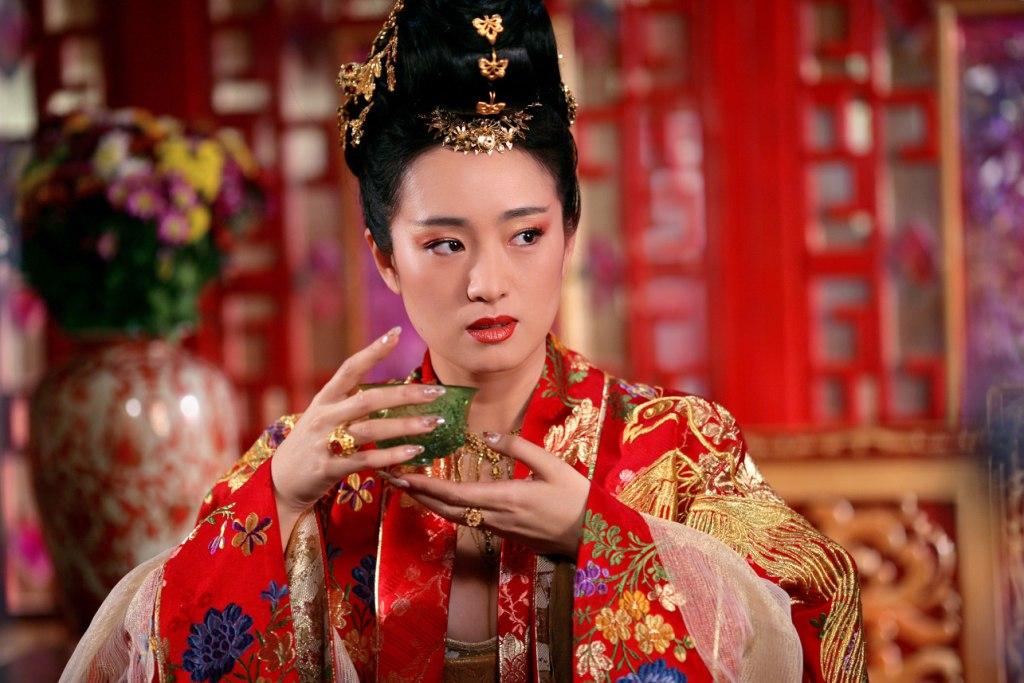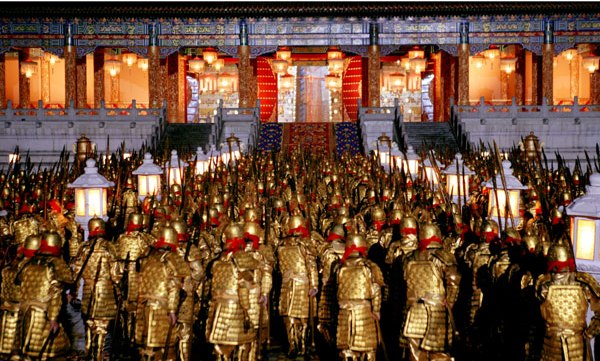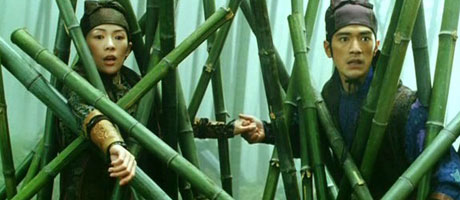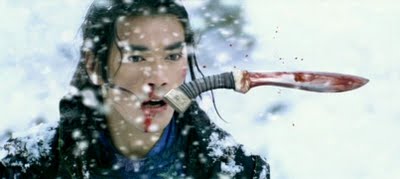Also in the trailer bin, Zhang Yimou of Hero, House of Flying Daggers, and Curse of the Golden Flower pays homage to the Coens with A Woman, A Gun, and a Noodle Shop, the Chinese remake of Blood Simple. (Also, dudes, “Chinamen” is not the preferred nomenclature.)
Tag: Zhang Yimou
It Takes an Empire.

[%@*#, that’s aggravating. Movable Type just ate my entire review. Ok, let’s try this again.] A lush, operatic saga of a cancerous ninth-century family fracas that threatens to topple the Tang Dynasty from within, Zhang Yimou’s Curse of the Golden Flower is the type of film for which the cliche “sumptuous visual feast” was coined. True, this sordid tale of betrayal, corruption, incest, and time-release murder is overwrought to the point of self-parody, and the action sequences — like those in Zhang’s House of Flying Daggers — eventually veer well past rousing to the far corner of preposterous. But, my, is this film gorgeous to look at: From start to finish, Curse of the Golden Flower is an explosion of riotous color. (Particularly after sitting through two hours of Letters from Iwo Jima‘s bleak, monochrome grays, viewing the veritable kaleidoscope on display here felt even more sensuous and indulgent.) Throw in some very watchable performances by Chow Yun-Fat, Gong Li, and others, and Curse comes across to me as the best entrant in Zhang’s recent trilogy of fanciful-historical Chinese epics (That would be Curse, Daggers, and the scarily nationalistic Hero — Fortunately the political subtext is more restrained and ambiguous here. In fact, Curse may even be revolutionary, depending on how you read the film’s final image.)
It is the hour of the rat for the Tang Dynasty, chrysanthemums bloom throughout the Middle Kingdom, and opulence comingles with palace intrigue in the halls of the Forbidden City. For the Emperor (Chow Yun-Fat, both fierce and serene), in his Divine wisdom, has seen fit to slowly and secretly poison his Empress (Gong Yi, equally good), by means of a deathly black fungus added to her daily medicine. The Empress, meanwhile, strains to rekindle her romance with the Emperor’s first son (by a previous marriage), the Crown Prince Wan (Liu Ye), but he only has eyes for a fetching maid (Li Man) in the imperial employ. (In fact, she is the daughter of the doctor administering the poison.) And also residing in this increasingly broke down palace are the Princes Jai (Jay Chou) and Yu (Qin Junjie), both of whom discover they have their own roles to play in the schemes of their feuding parents, particularly after the ailing Empress weaves a plot of vengeance to coincide with the coming festival…
Also milling about the Forbidden City is a cast of hundreds: the cooks, maids, laborers, soldiers, ninjas (Yes, this film has ninjas, or at least their Chinese equivalent), and ladies-in-waiting that make up the infrastructure undergirding the Tangs’ divine rule. Zhang goes out of his way here to emphasize the sheer amount of sweat and toil expected of this teeming support staff for even the most mundane task — It takes at least four servants to administer the Queen’s medicine and considerably more to cart the Emperor to and fro. Yet, Zhang seems to suggest, these people are as much part of the story as the resentful royals. They are the props of the extravagant ritual, rigid hierarchy, and striking beauty that characterize the Tang’s rule, and they are ennobled by knowing and playing their appropriate role in this imperial order. Whether or not you agree with this sentiment (and Zhang himself seems to cast doubt on it by the final shot), it does make for several breathtaking scenes of elaborate ceremony throughout the film.
And, yes, some of these are battles. To be honest, both Hero and House probably exhibited better fight choreography. If you come to Curse expecting a martial arts extravaganza akin to those films, you may well leave disappointed. I found the final Helms’ Deepish “silver versus gold” sequence to be too bloodthirsty (beheading prisoners and such), too unrealistic (here, more than anyone else in the film, physics don’t apply) and too obviously CGI for my taste. That being said, there are a few notable melees interspersed throughout the picture, most of them involving the black-clad, scythe-wielding “Flying Monkey”ish ninjas of the Imperial Army, who tend to swoop down from above and bury their scythes in the nearest possible revolutionary with extraordinary aplomb. (Sigh. Only one movie after Iwo Jima, and war and violence are already being made to look artful again.)

Trailer Convoy.
Several items for the trailer bin:
* Diane Lane and Thomas Jane go on the lam to escape hitmen Mickey Rourke and Joseph Gordon-Leavitt in this glimpse at John Madden’s Tarantino’ed-up version of Elmore Leonard’s Killshot. (Johnny Knoxville and Rosario Dawson are involved in some fashion as well.)
* Chow Yun-Fat and Gong Li gear up for some trademark Zhang Yimou wire-fu (a la Hero and House of Flying Daggers) in the new teaser for Curse of the Golden Flower.
* Nicole Kidman ventures through the photographic looking-glass as Diane Arbus in Fur: An Imaginary Portrait of Diane Arbus, the new film by Secretary‘s Steven Shainberg, also with Robert Downey Jr. (Mirrored here.)
* Helen Mirren jumps from Elizabeth I to Elizabeth II in this look at Stephen Frears’ The Queen, concerning Buckingham Palace’s reaction to the death of Princess Diana. (I have zero interest in the subject matter, frankly, but I do like Mirren, Frears, and James Cromwell, and there’s an iffy Tony Blair impression here by Michael Sheen, to say nothing of the guy playing Prince Charles.)
* Finally, Guillermo del Toro returns to the faerie Spain of The Devil’s Backbone in this rapid-edit teaser for Pan’s Labyrinth. (Being on a lousy hotel connection, I couldn’t get this link to work, but I believe the same teaser is mirrored here.)
2004 in Film.
Happy New Year, everyone. Inauspiciously for 2005, it looks like I’m starting the year a day late on the end-of-2004 movie roundup…but better late than never. As you probably already guessed, this year’s film list will be the first in four years without a Peter Jackson Tolkien adaptation in the #1 spot (although I’m still keeping it warm for The Hobbit in 2008.) Nevertheless, my top choice this year was an easy one, and those of y’all who come ’round here often can probably figure it out.
[2000/2001/2002/2003]
1) Eternal Sunshine of the Spotless Mind. The one true classic of 2004, Eternal Sunshine has only grown in my estimation since its initial release in March. (David Edelstein’s take on it as one of Harvard philosopher Stanley Cavell‘s remarriage comedies is well worth reading.) A heartfelt examination of love, loss, and memory, Eternal Sunshine was also a strikingly adult take on romance and relationships, the kind you usually don’t get from Hollywood. With great performances from a caged Jim Carrey and an electric Kate Winslet, the film managed to be both an earnest, passionate love story and a wistful paean to those person-shaped holes we all carry in our hearts and memories. Along with Annie Hall and High Fidelity, it goes down as one of my all-time favorite films about the mysteries of love. (Why even bother? We need the eggs.)
2) Garden State. Writer-director Zach Braff’s “anti-Graduate” debut was a small but touching ode to home that, along with reviving Natalie Portman as an actress and offering the best soundtrack of the year, delivered exactly what it promised. A bit hokey at times, sure, but Garden State wore its heart on its sleeve and, for the most part, got away with it. It was a witty and eloquent voyage to the Jersey burbs and a testament to the proposition that as Paul Weller put it, it’s never too late to make a brand new start.
3) The Incredibles. Pixar has been delivering well-constructed eye-popping wonders since Toy Story, and The Incredibles is the best of the lot. I figured it might be awhile before a movie topped Spiderman 2 as a sheer comic book spectacle, but, as it turned out, The Incredibles did it only a few months later. One of the best comic book films ever made, The Incredibles was two hours of unmitigated fanboy fun. I’m going to go out on a limb and say it’s probably also the best Fantastic Four film we’re ever going to see.
4) Sideways. Like a fine 1961 Cheval Blanc, Alexander Payne’s elegiac toast to California wine country and the regrets and indignities of middle-age has a tendency to linger in the senses. Paul Giamatti must tire of playing depressive, barely sociable losers, but he’s great at it here…Sideways isn’t as funny as Election, but it is a memorable trip.
5) Spiderman 2. A definite improvement on the first adventure of your friendly neighborhood wallcraller, Spiderman 2 was a perfectly made summer film that stayed true to the spirit of Peter Parker. Along with X2, this is the gold standard for comic book-to-film adaptations right now…let’s hope Batman Begins is up to snuff.
6) Shaun of the Dead. Although it lost its footing shambling to its conclusion, Shaun of the Dead was great fun for the first two-thirds of its run, and it’s now probably my favorite zombie movie (everyone should have one.) A much-needed dry British humor fix to tide us over until Hitchhiker’s Guide.
7) The Aviator. A bit on the long side, Scorsese’s life of Howard Hughes is most fun when it stays away from the airfields and lounges about Old Hollywood. Two very clean thumbs up.
8) The Assassination of Richard Nixon. A dark, unflinching 90-minute descent into violent futility. I originally had this before The Aviator, then figured the degree of difficulty on Scorsese’s flick was much, much higher. Nevertheless, this funereal biopic for non-billionaire crazies, while grim and not much fun, was well-made and well-performed, and I expect it’ll stay with me for awhile.
9) The Bourne Supremacy. Perhaps a bit too much like its predecessor, Bourne II was still a better Bond than anything we’ve seen in the past 20 years. Paul Greengrass’ shakicam work here bodes well for Rorshach in The Watchmen.
10) Harry Potter and the Prisoner of Azkhaban. It’d be hard to make a better film of Harry Potter’s adventures at Hogwarts than Alfonso Cuaron did here — Azkhaban managed to capture the dry wit and subversive spirit of the books that’s so missing in the Chris Columbus movies. That being said, Azkaban also made it clear that much of the fun of Rowling’s tomes is uncapturable on film. What was great fun to read on the page ended up seeming like Back to the Future II on the screen. With that in mind, Year 6 begins on 7/16.
11) Ocean’s 12. Two swollen hours of Soderberghian glamour and inside baseball. Not everyone’s cup of tea, I know, but I found it an agreeable improvement on Ocean’s 11. (Don Cheadle’s accent is still terrible, tho’.)
12) Touching the Void. Snap! Aigh! Crunch! Aigh! It’d be hard to forget anything as memorable as Shattered Femur Theater. Well worth seeing, if you can stand the pain.
13) Fahrenheit 9/11. Hmmm…perhaps this should be higher. I definitely left the theater in an angry froth (not that it takes much)…unfortunately, apparently so did all the freepers.
14) My Architect. An excellent documentary on Louis Kahn, brilliant architect and terrible family man. Alas, it’s also a less-excellent documentary on Kahn’s son, and his Oprah-like quest for self-acceptance.
15) Kinsey. Take that, red staters.
16) Hero. A memorable meditation on love, power, and kick-ass kung-fu, until its train-wreck derailing in the last half-hour.
17) The Life Aquatic with Steve Zissou. As I said yesterday, Aquatic was a jaunty Wes Anderson joyride that nevertheless gets a little lost in its terminal cuteness. When you care more about the leaving-behind of Cody the three-legged dog than you do the death of a major character, there’s a problem.
18) I Heart Huckabees. Huckabees had its heart in the right place, and made for a decently appealing night at the movies…but it also had a terminal-cute problem.
19) Collateral. If the movie had maintained the promise of its first hour throughout, Michael Mann’s Collateral would have been a top ten contender. Alas, it all falls apart once Tom Cruise goes bugnut psycho in da club.
20) Kill Bill, Vol. 2. There was probably one really good movie somewhere in the two Kill Bills. The second half was closer to it than the first.
Not Seen: Bad Education, Before Sunset, Finding Neverland, Friday Night Lights, Harold and Kumar, Hotel Rwanda, Maria Full of Grace, Million Dollar Baby, Ray, Spanglish
Worst Movies of the Year: Van Helsing, Sky Captain and the World of Tomorrow, The Chronicles of Riddick, The Village, Code 46, Closer, Alexander, 21 Grams (2003)
Biggest Disappointment: The Ladykillers
Ho-Hum: Team America: World Police, The Alamo, House of Flying Daggers, Troy, King Arthur, Anchorman, Blade: Trinity, Shrek 2
Worth a Rental: Mean Girls, The Manchurian Candidate,
Hellboy, The Machinist, City of God (2003)
Best Actor: Jim Carrey, Eternal Sunshine; Paul Giamatti, Sideways; Sean Penn, The Assassination of Richard Nixon.
Best Actress: Kate Winslet, Eternal Sunshine.
Best Supporting Actor: Thomas Haden Church, Sideways
Best Supporting Actress: Cate Blanchett, The Aviator; Virginia Madsen, Sideways.
2005: On paper, it’s looking like a better year for film, fanboy and otherwise, than 2004. The slate includes Star Wars Episode III, Batman Begins, The Chronicles of Narnia, All the King’s Men, PJ’s King Kong, Burton’s Charlie and the Chocolate Factory, Spielberg’s War of the Worlds, Gilliam’s The Brothers Grimm, Polanski’s Oliver Twist, Malick’s The New World, Harry Potter and the Goblet of Fire, Constantine, Sin City, Fantastic Four, and my own most-anticipated project, Hitchhiker’s Guide to the Galaxy. So here’s to the new year!
House of Cards.

It’s clear early on in House of Flying Daggers that Zhang isn’t shooting for anything with the ambition and gravitas of Hero…Instead, we’ve got a plot strung together with a number of genre cliches, most notably the “deep” undercover cop (Takeshi Kaneshiro) questioning his motivation and the sixth-sense-laden blind girl (Zhang Zi Yi, lovely as always) who improbably kicks more ass than Rutger Hauer in Blind Fury. Hey, genre exercises are cool…let’s get to the fighting. Alas, there seemed to be a lot of filler between the action setpieces, and I found myself hoping through several unmemorable meet-cute scenes that more low-level flunky guards would show up and be efficiently dispatched.
With that in mind, I know it’s a little late to be complaining about the realism of kung-fu sequences. But the fights in House of Flying Daggers are so stylized and farfetched that I didn’t find them all that engaging — there was no real sense of danger to be had. In Crouching Tiger, Hero and countless lesser kung-fu films, I never found myself thinking so much about the logistics of what’s going on, but Daggers seems to beg questions like, “Where are these tree-flying policemen obtaining their inexhaustible supply of bamboo spears?” and “How straight and true could you throw a dagger if gravity was of absolutely no consequence?” Perhaps it’s unfair to call out this House for its fantastical fight sequences, but for one reason or another my disbelief was suspended less than usual.
At any rate, not to give the whole game away, but the movie does eventually contain some unexpected twists in the middle going. That being said, the denouement of the film also suffers from one of the most egregious dead-“not dead” reverses I’ve seen in recent memory. If martial arts films are your bag, then you’ll probably find House of Flying Daggers an operatic tale of love, passion, and betrayal. But, as for me, I kinda wish these two young lovers had spent less time being smitten and more time smoting.

Heroine.
If Hero didn’t satisfy your quota for arthouse kung-fu in 2004, the teaser for Zhang Yimou’s House of Flying Daggers is now up, and it looks to be more of the same aesthetic…hopefully, with less jingoism this time around.
Culture Shock.

With the movie situation for the next few months looking somewhat grim, I went to see Zhang Yimou’s Hero yesterday with high hopes. But, like a maddening Zen parable, Hero left me of divided mind. Well worth seeing for its colorful meditations on swordplay, music, calligraphy, and story-telling, the film fumbles the sword something fierce when it starts dabbling in political economy…so much so that it basically completely took me out of the movie. Alas, what had started as a very worthy successor to Crouching Tiger, Hidden Dragon ended as an almost laughable exercise in knee-jerk ultra-nationalism. As such, it’s hard not to discuss Hero without resorting to massive spoilers, so here goes.
For much of its running time, Hero is a strikingly kinetic and poetic piece of work that lulls you in with its languid rhythm and sensual colors. As you may or may not know from the ads, a nameless warrior (Jet Li) comes before the rightly paranoid Emperor Qin (a very good Chen Daoming) to tell him of how he managed to eliminate the province’s three most dangerous assassins (an all-star line-up of Donnie Yen, Maggie Cheung, and Tony Leung, with the lovely Zhang Ziyi thrown in to boot.) But, faster than you can say Swift Boat, the Emperor tells Nameless he’s full of it, and offers his own explanation for recent acts of heroism, which are further revised as the film goes forth.
As I said, these various retellings move slowly — even despite the fighting — but with purpose, and are made distinct from one another through color shifts that are at once exquisite and bewitching. But, eventually we come to the end of the story, and therein the problem lies. For, as it turns out, the moral that undergirds our recent contemplations is a pretty reprehensible one (and one you’d think might have been re-evaluated in light of the last century): Namely, that brutal, despicable tyrants must be allowed their cruelties and massacres for the sake of the State.
When this Machiavellian might-makes-right proposition was first uttered by the characters, I thought perhaps I was misreading what was going on. But, no, they go through with it, and almost all of the major characters we’ve been following take a dive in varying fits of nationalistic self-sacrifice, so that the Emperor Qin can gloriously maim, loot, and murder his way into uniting the Middle Kingdom. And, thus the film concludes with the glaring contradiction (pointed out by my friend Jeremy) of mooning over lovers to-be-reunited in “a place without borders” while extolling The Great Wall, still probably the most impressive border every built by humankind.
In sum, Hero is a sumptuous visual feast that’s operating several levels above most schlocky American action pics (including the recent Kill Bills of its US “presenter.”) But the underlying moral sensibility of the final moments is so repellent that it seriously detracts from the film. Call me an incurable Western individualist, but if excusing the crimes of one’s leader for the sake of the (Mother, Father, etc.)Land is heroism, then I’m with Tina Turner. Take it elsewhere, Raggedy Man.

